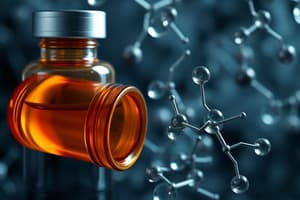Podcast
Questions and Answers
Genetics is concerned with the study of heredity.
Genetics is concerned with the study of heredity.
True (A)
What is the primary role of testosterone in males?
What is the primary role of testosterone in males?
- Increase in muscle mass only
- Stimulating the immune system
- Development of male reproductive tissues and secondary sexual characteristics (correct)
- Regulating body temperature
What does the term 'phenotype' refer to?
What does the term 'phenotype' refer to?
The expression of genetic traits influenced by environmental factors.
A _____ is a basic unit of heredity found at a specific location on a chromosome.
A _____ is a basic unit of heredity found at a specific location on a chromosome.
Match the terms with their correct definitions:
Match the terms with their correct definitions:
What is the primary function of the spinal reflex?
What is the primary function of the spinal reflex?
The corpus callosum connects the two hemispheres of the cerebrum.
The corpus callosum connects the two hemispheres of the cerebrum.
Which hormone does the pineal gland secrete?
Which hormone does the pineal gland secrete?
The ______ is known as the master gland of the endocrine system.
The ______ is known as the master gland of the endocrine system.
Match the following glands with their functions:
Match the following glands with their functions:
Which of the following hormones is responsible for balancing the body's response to stress?
Which of the following hormones is responsible for balancing the body's response to stress?
Hypothyroidism is characterized by excessive production of thyroxin.
Hypothyroidism is characterized by excessive production of thyroxin.
What are the two primary sections of the cerebral cortex?
What are the two primary sections of the cerebral cortex?
What is the primary function of glial cells in the nervous system?
What is the primary function of glial cells in the nervous system?
Afferent neurons transmit messages from the brain to the muscles.
Afferent neurons transmit messages from the brain to the muscles.
What is the action potential in a neuron?
What is the action potential in a neuron?
The fatty substance that insulates axons is called __________.
The fatty substance that insulates axons is called __________.
Match the following types of neurons with their functions:
Match the following types of neurons with their functions:
Which term describes the phase when a neuron is less sensitive to firing after it has already fired?
Which term describes the phase when a neuron is less sensitive to firing after it has already fired?
The all-or-none principle means that a neuron can fire at different strengths.
The all-or-none principle means that a neuron can fire at different strengths.
Define 'polarize' in the context of neural function.
Define 'polarize' in the context of neural function.
Flashcards are hidden until you start studying
Study Notes
Testosterone and Reproductive Development
- Testosterone is crucial for the development of male reproductive tissues, including the testicles and prostate.
- It also promotes secondary sexual characteristics in males.
Heredity and Genetics
- Genetics studies heredity, which is the transmission of traits from parents to offspring via genes.
- A gene is a basic unit of heredity, located at specific points on chromosomes.
- Humans possess 46 chromosomes that carry hereditary traits, formed from DNA, which has a double helix structure.
Genetic Terms
- Genotype refers to the complete genetic potential of an organism.
- Phenotype is the expression of genetic traits impacted by environmental conditions.
- Nature represents innate characteristics, while nurture encompasses environmental influences from conception onward.
Neurons and Their Functions
- Neurons are specialized cells that receive and transmit messages in the nervous system.
- Glial cells support neurons by removing waste and insulating them.
Parts of Neurons
- Dendrites receive incoming messages, while the axon transmits impulses to other neurons.
- Myelin is a fatty substance that insulates axons to enhance the speed of message transmission.
Types of Neurons
- Afferent neurons transmit sensory messages to the brain, also known as sensory neurons.
- Efferent neurons carry messages from the brain to muscles and glands, referred to as motor neurons.
Neural Impulses
- Neural impulses involve the electrochemical discharge of neurons.
- Polarization prepares neurons for firing by maintaining a negative internal charge compared to external fluid.
- Action potential is the electrical impulse that enables conduction along axons.
Synapse and Communication
- Synapses are junctions between the axon terminals of one neuron and the dendrites of another.
- The all-or-none principle states that a neuron fires at the same strength if the action potential is triggered.
- The refractory period occurs post-firing when a neuron is less responsive.
Spinal Reflex and Neural Structure
- Spinal reflexes are quick, unlearned responses involving a few neurons.
- Gray matter contains neuronal bodies involved in reflexes, while white matter consists of axon bundles for communication to and from the brain.
Cerebral Cortex and Brain Structure
- The cerebral cortex is the outer gray matter layer of the cerebrum, which has two hemispheres.
- The corpus callosum connects both hemispheres.
- The somatosensory cortex processes sensory information, located in the parietal lobe.
- The motor cortex, situated in the frontal lobe, is linked to muscular responses.
Endocrine System Overview
- The endocrine system consists of ductless glands that secrete hormones directly into the bloodstream, regulating body functions.
Key Glands and Hormones
- The pituitary gland, known as the master gland, secretes growth hormone and others.
- The pineal gland produces melatonin, regulating the sleep-wake cycle.
- The thyroid gland creates thyroxin, influencing metabolism; issues here can lead to conditions like hypothyroidism or hyperthyroidism.
- Adrenal glands produce essential hormones like cortisol and adrenaline, regulating metabolism and stress response.
Sex Hormones
- Estrogen promotes female reproductive characteristics and related traits.
- Progesterone aids in the growth of reproductive organs and prepares the uterus for pregnancy.
Studying That Suits You
Use AI to generate personalized quizzes and flashcards to suit your learning preferences.





